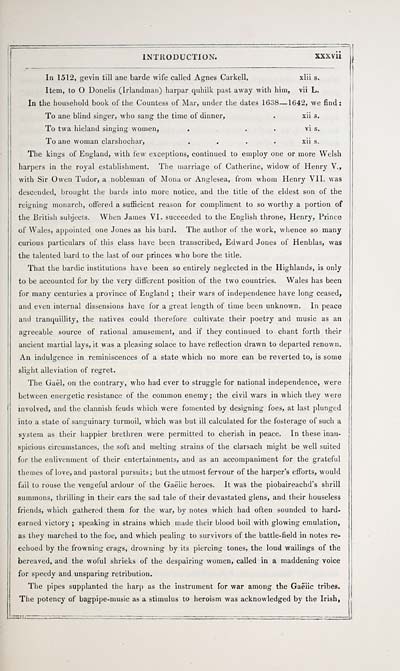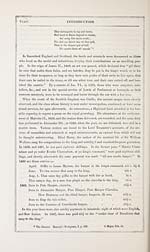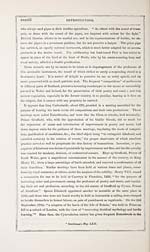Blair Collection > Sar-obair nam bard gaelach, or, The beauties of Gaelic poetry, and lives of the Highland bards
(47)
Download files
Complete book:
Individual page:
Thumbnail gallery: Grid view | List view

INTRODUCTION. XXXVll
In 1512, gevin till ane barde wife called Agnes Carkell, xlii s.
Item, to O Donelis (Irlandman) liarpar quliilU past away with liim, vii L.
In the household book of the Countess of Mar, under the dates 1638 — 1642, we find;
To ane blind singer, who sang the time of dinner, . xii s.
To twa hieland singing women, . . . . vi s.
To ane woman clarshochar, . . . . xii s.
The kings of England, with few exceptions, continued to employ one or more Welsh
harpers in the royal establishment. The marriage of Catherine, widow of Henry V.,
with Sir Owen Tudor, a nobleman of Mona or Anglesea, from whom Henry VII. was
descended, lirought the bards into more notice, and the title of the eldest son of the
reigning monarch, offered a sufficient reason for compliment to so worthy a portion of
the British subjects. When James VI. succeeded to the English throne, Henry, Prince
of Wales, appointed one Jones as his bard. The author of the work, whence so many
curious particulars of this class have been transcribed, Edward Jones of Henblas, was
the talented bard to the last of our princes who bore the title.
That the bardic institutions have been so entirely neglected in the Highlands, is only
to be accounted for by the very different position of the two countries. Wales has been
for many centuries a province of England ; their wars of independence have long ceased,
and even internal dissensions have for a great length of time been unknown. In peace
and tranquillity, the natives could therefore cultivate their poetry and music as an
agreeable source of rational amusement, and if they continued to chant forth their
ancient martial lays, it was a pleasing solace to have reflection drawn to departed renown.
An indulgence in reminiscences of a state which no more can be reverted to, is some
slight alleviation of regret.
The Gael, on the contrary, who had ever to struggle for national independence, were
between energetic resistance of the common enemy; the civil wars in which they were
involved, and the clannish feuds which were fomented by designing foes, at last plunged
into a state of sanguinary turmoil, which was but ill calculated for the fosterage of such a
system as their happier brethren were permitted to cherish in peace. In these inau-
spicious circumstances, the soft and melting strains of the clarsach might be well suited
for the enlivenment of their entertainments, and as an accompaniment for the grateful
themes of love, and pastoral pursuits; but the utmost fervour of the harper's efforts, would
fail to rouse the vengeful ardour of the Gaelic heroes. It was the piobaireachd's shrill
summons, thrilling in their ears the sad tale of their devastated glens, and their houseless
friends, which gathered them for the war, by notes which had often sounded to hard,
earned victory ; speaking in strains which made their blood boil with glowing emulation,
as they marched to the foe, and which pealing to survivors of the battle-field in notes re-
echoed by the frowning crags, drowning by its piercing tones, the loud wailings of the
bereaved, and the woful shrieks of the despairing women, called in a maddening voice
for speedy and unsparing retribution.
The pipes supplanted the harp as the instrument for war among the Gaelic tribes.
The potency of bagpipe-music as a stimulus to heroism was acknowledged by the Irish,
In 1512, gevin till ane barde wife called Agnes Carkell, xlii s.
Item, to O Donelis (Irlandman) liarpar quliilU past away with liim, vii L.
In the household book of the Countess of Mar, under the dates 1638 — 1642, we find;
To ane blind singer, who sang the time of dinner, . xii s.
To twa hieland singing women, . . . . vi s.
To ane woman clarshochar, . . . . xii s.
The kings of England, with few exceptions, continued to employ one or more Welsh
harpers in the royal establishment. The marriage of Catherine, widow of Henry V.,
with Sir Owen Tudor, a nobleman of Mona or Anglesea, from whom Henry VII. was
descended, lirought the bards into more notice, and the title of the eldest son of the
reigning monarch, offered a sufficient reason for compliment to so worthy a portion of
the British subjects. When James VI. succeeded to the English throne, Henry, Prince
of Wales, appointed one Jones as his bard. The author of the work, whence so many
curious particulars of this class have been transcribed, Edward Jones of Henblas, was
the talented bard to the last of our princes who bore the title.
That the bardic institutions have been so entirely neglected in the Highlands, is only
to be accounted for by the very different position of the two countries. Wales has been
for many centuries a province of England ; their wars of independence have long ceased,
and even internal dissensions have for a great length of time been unknown. In peace
and tranquillity, the natives could therefore cultivate their poetry and music as an
agreeable source of rational amusement, and if they continued to chant forth their
ancient martial lays, it was a pleasing solace to have reflection drawn to departed renown.
An indulgence in reminiscences of a state which no more can be reverted to, is some
slight alleviation of regret.
The Gael, on the contrary, who had ever to struggle for national independence, were
between energetic resistance of the common enemy; the civil wars in which they were
involved, and the clannish feuds which were fomented by designing foes, at last plunged
into a state of sanguinary turmoil, which was but ill calculated for the fosterage of such a
system as their happier brethren were permitted to cherish in peace. In these inau-
spicious circumstances, the soft and melting strains of the clarsach might be well suited
for the enlivenment of their entertainments, and as an accompaniment for the grateful
themes of love, and pastoral pursuits; but the utmost fervour of the harper's efforts, would
fail to rouse the vengeful ardour of the Gaelic heroes. It was the piobaireachd's shrill
summons, thrilling in their ears the sad tale of their devastated glens, and their houseless
friends, which gathered them for the war, by notes which had often sounded to hard,
earned victory ; speaking in strains which made their blood boil with glowing emulation,
as they marched to the foe, and which pealing to survivors of the battle-field in notes re-
echoed by the frowning crags, drowning by its piercing tones, the loud wailings of the
bereaved, and the woful shrieks of the despairing women, called in a maddening voice
for speedy and unsparing retribution.
The pipes supplanted the harp as the instrument for war among the Gaelic tribes.
The potency of bagpipe-music as a stimulus to heroism was acknowledged by the Irish,
Set display mode to: Large image | Transcription
Images and transcriptions on this page, including medium image downloads, may be used under the Creative Commons Attribution 4.0 International Licence unless otherwise stated. ![]()
| Early Gaelic Book Collections > Blair Collection > Sar-obair nam bard gaelach, or, The beauties of Gaelic poetry, and lives of the Highland bards > (47) |
|---|
| Permanent URL | https://digital.nls.uk/81868432 |
|---|
| Description | A selection of books from a collection of more than 500 titles, mostly on religious and literary topics. Also includes some material dealing with other Celtic languages and societies. Collection created towards the end of the 19th century by Lady Evelyn Stewart Murray. |
|---|
| Description | Selected items from five 'Special and Named Printed Collections'. Includes books in Gaelic and other Celtic languages, works about the Gaels, their languages, literature, culture and history. |
|---|

